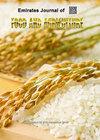生长在桉树生物质上的小扁豆酚含量和抗氧化活性
IF 0.7
4区 农林科学
Q3 AGRONOMY
引用次数: 0
摘要
目的确定在厄瓜多尔高原桉树木屑上培养的扁豆(Lentinula edodes)是否会产生抗氧化代谢物和抗炎作用。 研究方法:采用化学方法测定总酚含量。用 Folin-Ciocalteu 反应测定总酚含量,用 DPPH 法评估莱菔子提取物的体外抗氧化活性,用小鼠研究其体内抗炎活性。通过植物化学筛选和气相色谱/质谱法(GC/MS)对化学成分进行了研究。 结果显示含水量越高的提取物总酚越高。这些萃取物的抗氧化活性很强,而且明显高于其他萃取物,这表明活性代谢产物是水溶性的。只有水提取物具有显著的抗炎活性。植物化学筛选表明,其总体成分与之前报道的文献相似。GC/MS 检测到半乳糖醇、三卤糖、木糖醇、磷酸和十八酸等代谢物含量最高。 结论在厄瓜多尔高原的桉树生物质上进行栽培,保留了莱德菌的整体化学成分、酚类含量、抗氧化水平和体内抗炎活性。所观察到的 11.3% 的三卤糖含量对其控制细胞应激损伤的能力很有意义。 关键词:炎症、抗氧化剂、酚类、香菇、扁豆、植物疗法本文章由计算机程序翻译,如有差异,请以英文原文为准。
Phenolic content and antioxidant activity in Lentinula edodes grown on eucalyptus biomass
Objective. To determine whether Lentinula edodes (L edodes) cultured on eucalyptus chips in the Ecuadorian highland generates antioxidant metabolites and anti-inflammatory effects. Methods. Total phenolic content was determined by the Folin-Ciocalteu reaction, the in vitro antioxidant activity of L edodes extracts was evaluated by the DPPH method and the in vivo anti-inflammatory activity was studied in mice. The chemical composition was studied by phytochemical screening and gas chromatography/mass spectrometry (GC/MS). Results. Total phenols were higher in extracts with increasingly high-water content. The antioxidant activity was robust and significantly strong in these extracts, suggesting the active metabolites are water-soluble. The anti-inflammation activity was significant in aqueous extracts only. Phytochemical screening indicated an overall similar composition to the literature reported earlier. GC/MS detected galactitol, trehalose, xylitol, phosphoric acid and octadecanoic acid among the most abundant metabolites. Conclusions. Cultivation on eucalyptus biomass at the Ecuadorian highlands retains the overall chemical composition, the phenolic content, antioxidant levels, and the in vivo anti-inflammatory activity of L edodes. The 11.3% content of trehalose observed is interesting for its capacity to control cellular stress damage. Key Words: inflammation, antioxidants, phenols, shiitake, Lentinula, phytotherapeutics
求助全文
通过发布文献求助,成功后即可免费获取论文全文。
去求助
来源期刊

Emirates Journal of Food and Agriculture
AGRONOMYFOOD SCIENCE & TECHNOLOGY&nb-FOOD SCIENCE & TECHNOLOGY
CiteScore
1.80
自引率
0.00%
发文量
18
期刊介绍:
The "Emirates Journal of Food and Agriculture [EJFA]" is a unique, peer-reviewed Journal of Food and Agriculture publishing basic and applied research articles in the field of agricultural and food sciences by the College of Food and Agriculture, United Arab Emirates University, United Arab Emirates.
 求助内容:
求助内容: 应助结果提醒方式:
应助结果提醒方式:


